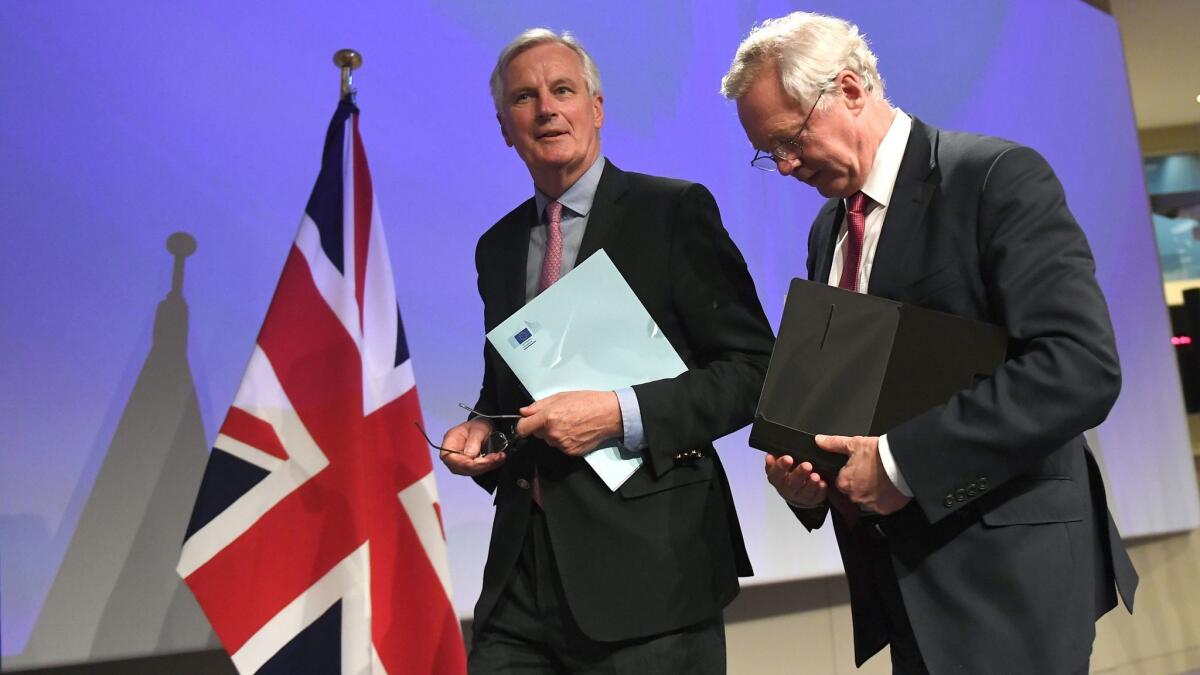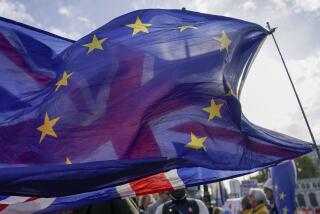Divorce talks finally begin between Britain and the European Union

- Share via
Reporting from Brussels — Amid deep uncertainty over the future relationship between Britain and the European Union, negotiators from both sides did their best to put a positive spin on the first official day of divorce talks.
“There is more that unites us than divides us,” Britain’s top negotiator, David Davis, told reporters Monday before the start of seven hours of discussions.
At one point, officials took a short break to smile and pose for photographs holding gifts. The top EU negotiator, Michel Barnier, a former foreign minister of France, gave Davis a walking stick from his home region in the Alps. Davis gave Barnier a book about hiking.
The talks will address a number of issues, including how much money Britain will owe the political and economic union, the rights of British citizens in the EU and EU citizens in Britain, and how to minimize the effects of the split on the fragile peace between Northern Ireland and Ireland.
Unless all of the leaders of all the EU countries agree to an extension, Britain is required to leave the union by March 2019. The talks are scheduled to take place for one week each month until an agreement is reached.
“It was very important and useful to start off on the right foot as the clock is ticking,” Barnier said Monday after the talks, held at the European Commission’s headquarters in Brussels.
It’s been nearly a year since British voters approved the referendum known as Brexit to leave the EU and nearly three months since Prime Minister Theresa May formally launched the separation process.
She had hoped to strengthen her government’s hand in the negotiations by holding a snap election this month and solidifying the hold of her Conservative Party on the parliament. But the move backfired, as the party lost its majority and is now trying to form a governing coalition with the right-wing Northern Irish Democratic Unionist Party.
May has pushed for a “hard Brexit” in which existing agreements over trade and free movement of people would be blown up and renegotiated. But her political weakening has prompted speculation that she will be forced to bend to opposing parties’ demands for a “soft Brexit.”
“The number of options where all of this can lead has become much bigger than it was before,” said Guntram Wolff, director of the Brussels-based think tank Bruegel.
“There is more political fragility, but the 27 European countries certainty don’t want to end up in a sort of long-term relationship that would be one of animosity with the United Kingdom,” he said.
He and others have also raised the possibility that Britain could remain in the EU.
Since the British election, French President Emmanuel Macron and German Foreign Minister Sigmar Gabriel have said they would welcome Britain back if it reversed its decision to leave the union.
“I can’t say whether there is a chance of that happening,” Gabriel said Monday at a meeting of EU foreign ministers. “But we are definitely ready for it because Europe is weaker without the British but I think the British would also be weaker without us Europeans.”
But Davis, the British negotiator, told reporters Monday that he flatly rejected those offers.
He also stuck to May’s position that Britain will pursue a completely new trade agreement with the union. May’s government has said it wants that accord in place when the country separates in two years. Currently, nearly half of its exports go to EU countries.
But EU leaders say that before trade talks can begin they want to work out three other issues.
First, they want a guarantee that Britain will honor its previous budget commitments to the EU, which could be as much as $100 billion. Davis has said Britain will not pay that much.
Second, they want clarity on the rights of citizens to live, travel and work within the EU and Britain. Currently, more than 3 million EU citizens live in Britain, and 1 million British citizens live in other parts of the EU. Davis said that the two sides already have similar positions.
Finally, they want to ensure that the 1998 Good Friday peace agreement between Ireland, and EU member, and Northern Ireland, which is part of Britain, is not put in jeopardy. That agreement, which largely put a stop to decades of sectarian violence, dissolved any visible signs of border between the two. Both the EU and Britain said earlier this year that they want to keep it that way after Brexit. Ireland’s leaders have warned that any new barriers could be a setback for peace.
More broadly, Brexit talks will have to address a range of regulatory issues, including laws about worker rights, climate and agriculture.
At a news conference after Monday’s talks, Davis quoted Winston Churchill: “A pessimist sees the difficulty in every opportunity. An optimist sees the opportunity in every difficulty. I am certainly a determined optimist.”
Barnier quoted Jean Monnet, a founder of the EU: “I’m neither optimistic nor pessimistic. I am determined.”
Stupp is a special correspondent.
More to Read
Sign up for Essential California
The most important California stories and recommendations in your inbox every morning.
You may occasionally receive promotional content from the Los Angeles Times.










